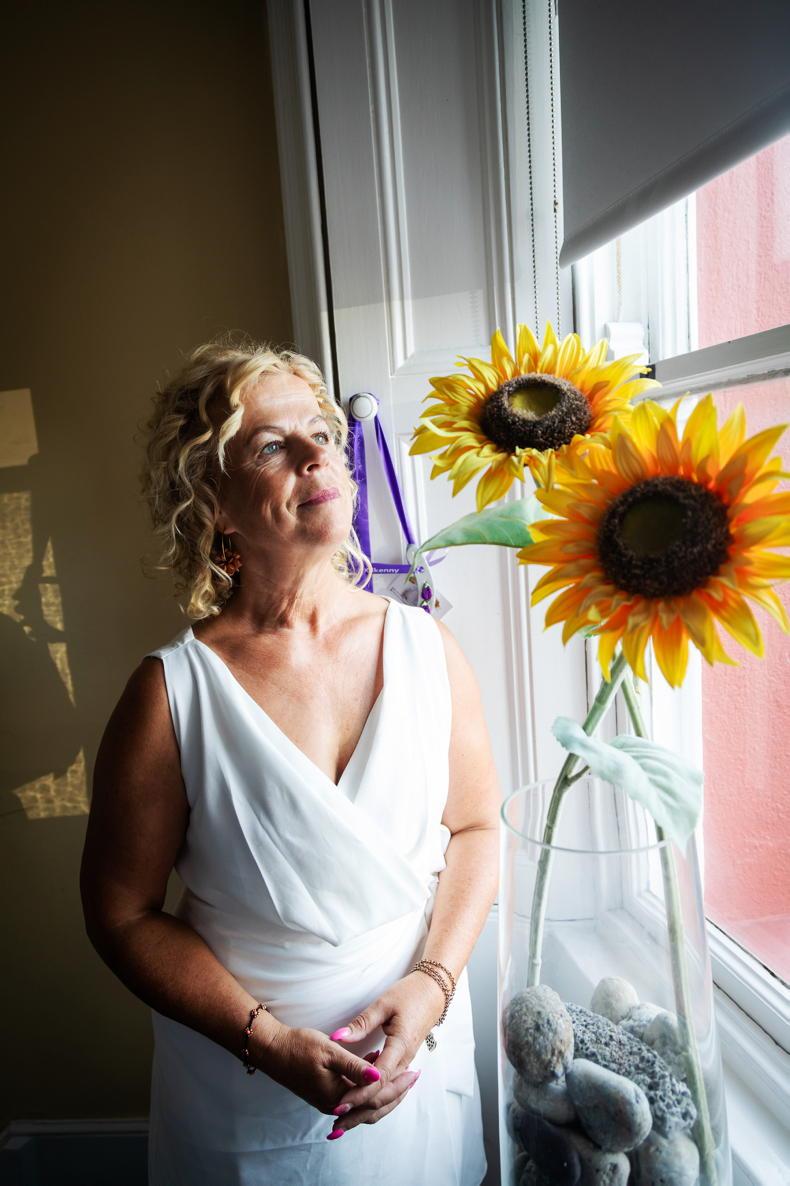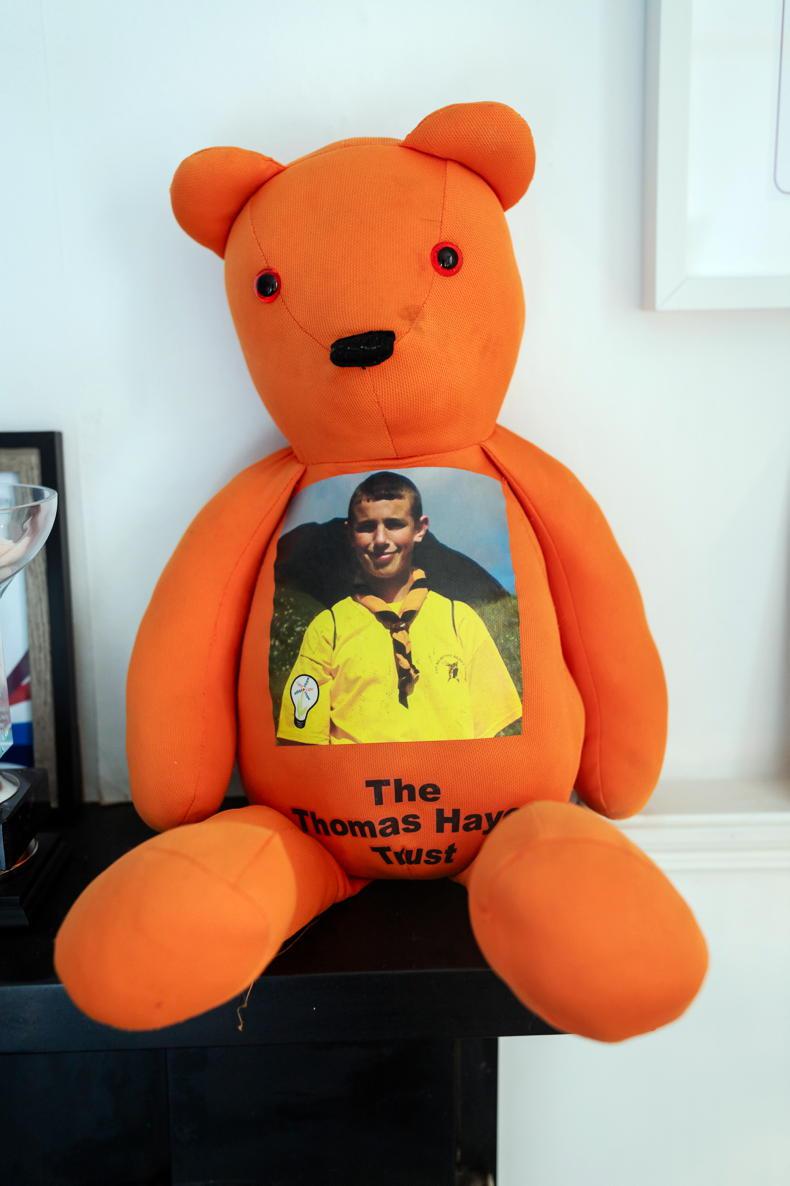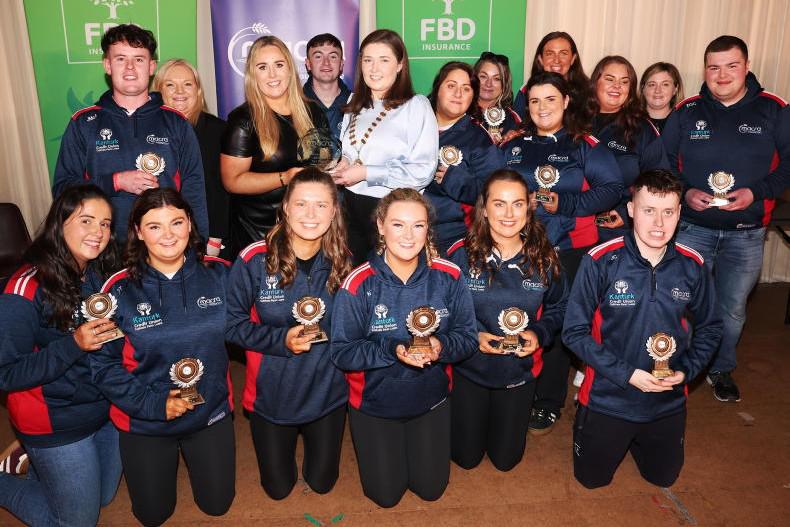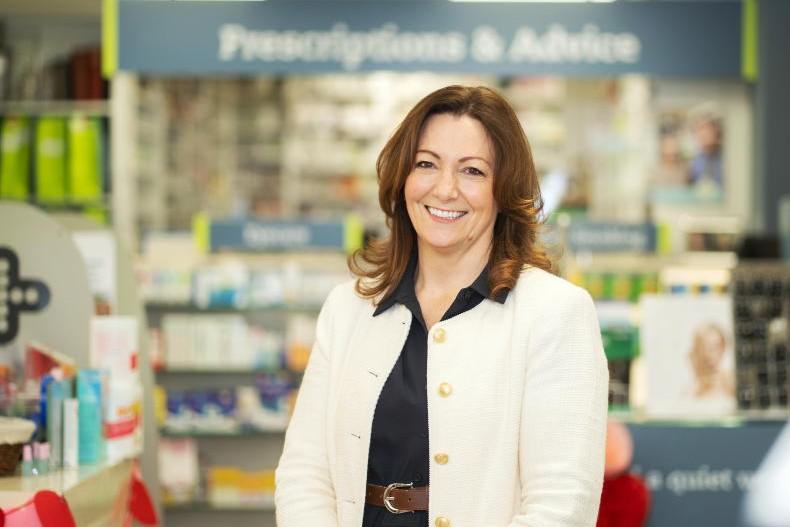Thomas is my little sunflower,” Angela Hayes says, tenderly touching a sunflower in a vase at the top of the stairs in Teac Tom, in the heart of Kilkenny, before pointing to a photo of her ‘beautiful boy’.
She is giving a tour of the centre, which provides a range of supports and around 100 sessions of free counselling every week to anyone who is struggling with their mental health, or has been bereaved by suicide.
Teac Tom was created 10 years ago by Angela in memory of her late son Thomas and husband, Tommy. At 19, Thomas died by suicide in 2011. Heartbreakingly, her son’s death happened on the 9th anniversary of his father’s death, who also died by suicide.
“I don’t feel that anyone should have to balance whether they can buy a week’s groceries, like I did for the boys and myself, or a counselling session. That should never be the situation, but that’s the reality,” says Angela on why she was prompted to set up Teac Tom.
Devastating loss
When she lost her husband on 19 March 2002, her eldest boy was 13 and the youngest of her four boys was only four years of age. Life was “really hard” and “challenging,” just trying to provide for them and keep her family well after such a devastating loss.
Without the support of her beloved parents, friends like Therese, the boy’s teachers and mentors, and her faith, she would not have been able to cope.

Angela Hayes photographed outside Teac Tom's centre in Kilkenny city, the charity she set up in the aftermath of losing her son Tom to suicide. She is pictured with two staff members Teresa Bourke and Rory Connellan. \ Claire Nash
“I found with five of us grieving for my husband, we were all grieving differently. It’s very hard; it’s like walking on eggshells. That’s what it is like – there’s a sudden death, there is anger, there are those questions. Could I have done something? Could I have seen something? Could I have helped? There are all those questions.
“But also, the suddenness of it and how it’s unexplained. That’s why death by suicide is very different from a general bereavement,” says Angela.
“Nothing,” is Angela’s reply when asked if there was any professional help for her after her husband’s death. There was a HSE appointment nine months later with the entire family and it was declared they were “coping well.”
Later though, the Kilkenny native could see the boys needed assistance with their grief and two went to the Rainbows programme, but there was nothing available for the older children.
“Life was very, very difficult with the four boys. The eldest was not doing so well and, as I said, it affected him worse because of his age (he was 13).”
She is very grateful that her son has been able to turn the corner after a challenging time and get the help he needed to recover and live his life to the fullest.
Gradually, as the years progressed, things started to improve for Angela. She met a new partner, and went on to have a daughter, Caoimhe, in 2010, the same year she also became a grandmother.
However, she was utterly devastated on the 9th anniversary of her husband’s death the following year when her second eldest boy, Thomas, died by suicide.
“He was training to be a chef, and he was in the Scouts. He loved life, he was a really happy, bubbly guy,” Angela remembers, wiping away tears as she speaks.
“He was always the person to be there for me when I was so sad….Thomas was always trying to make my life a little easier,” she says, smiling through obvious distress.
“It was so out of the blue because he didn’t show any signs of his own pain or hurt. Now when you look back on it, I could definitely see that day he was uneasy in himself, but I wouldn’t have thought anything of it on that day (his dad’s anniversary).”
Her voice trembles as she relays the devastation suffered by her family.
“It was hard. Only for my baby I don’t think I would have survived,” Angela says starkly of her then one-year-old, and while she had the boys, now grown up, this baby really needed her.

Angela Hayes photographed at Teac Tom in Kilkenny, the charity she set up in the aftermath of losing her son and husband to suicide. Sunflowers always remind her of her late son. \ Claire Nash
She remembers many times sitting on Thomas’s grave crying uncontrollably, saying her heart was broken by his loss.
“I suppose coping with all of that and the worry of it all – the boys, how were they going to end up in their lives, how were they going to get through each day – consumed me.”
While she had faith before, losing her son left her with little, and she was very angry and exhausted.
Again though, the support of family, friends and her community kept her going in hard times. A trip to Medugorje organised by Joe Malone helped two of her sons find some peace. They travelled together as a family in 2012 and now go every year.
“We found peace and comfort there and it has restored my whole family’s faith for definite.”
Helping others
In early 2014, Angela was asked to speak about her story at a mental health event organised by Conor Cusack, and it was the first time she had ever spoken about it in public.
She was overwhelmed by the response and later appeared on national television with her son, Alan, who had written a poignant song for her, called Survivor.
The song was later released as a charity single and this kick-started Angela into action to use her traumatic experience to do something positive for others.
A lot of people were asking her for help and her plan was to set up Teac Tom – The Thomas Hayes Trust and use the funds raised to give free counselling to people.
“Since that, I’ve discovered exposing my vulnerability allows people to feel safe that they can share, hear what I am saying and then verbalise their own situation, knowing it’s okay to talk about it,” says Angela.
The organisation, which relies on fundraising to stay going, formally opened in March of 2014.
Operating an open-door policy, Angela is comforted by the fact that anyone struggling with their mental health or bereaved by suicide can come in and avail of counselling. It also operates a 24/7 helpline manned by trained volunteers, support groups and outreach talks in the community.

A Teddy in Teac Tom with a photo printed on the front of the late Thomas Hayes, who died aged just 19 in 2011. \ Claire Nash
“Within 24 hours of contacting the centre you will have support one way or the other,” Angela vows, noting that they have seen a doubling of teenagers presenting since they started doing talks in schools and many problems arising post-pandemic for people who feel isolated.
“We don’t have a waiting list. We offer the service free of charge.”
The multi-award-winning service also has a holistic approach, in that it doesn’t just deal with an individual, Teac Tom provides support for the entire family.
The centres in Kilkenny and Stradbally, Co Laois, cost €25,000 a month in total to run, providing pay for 15 people, including all the therapists plus all of the overheads in both, according to Angela, but the result is 400 sessions of free counselling every month, which is “phenomenal.”
It only received some HSE funding for the first time last year to stave off closure and is operating month to month at present, so they are very grateful for the community for their ongoing support and welcome anyone who wants to fundraise for them.
Rightly proud of this “low cost high impact service,” Angela would love to see some of the mental health budget go to organisations like theirs.
“Teac Tom gives people the tools to manage their mental health and to live their life as best they can.”
She has great pride too in her family and what they have achieved. Her son Stephen is a carpenter and is now married with two children and Robert has a partner and a baby, and is working in social care.
Alan, who has a partner lives in Australia, put himself through Oxford and is now an occupational therapist. Daughter Caoimhe (14) is in second year and loves horse riding and kayaking and is similar to Thomas in so many ways.
Now Angela’s vision is that there will be a Teac Tom in every county in Ireland, and she is willing to work in her role as an activist to make that happen.
Teac Tom’s 24-hour helpline can be contacted by calling 056-7796592.
Thomas is my little sunflower,” Angela Hayes says, tenderly touching a sunflower in a vase at the top of the stairs in Teac Tom, in the heart of Kilkenny, before pointing to a photo of her ‘beautiful boy’.
She is giving a tour of the centre, which provides a range of supports and around 100 sessions of free counselling every week to anyone who is struggling with their mental health, or has been bereaved by suicide.
Teac Tom was created 10 years ago by Angela in memory of her late son Thomas and husband, Tommy. At 19, Thomas died by suicide in 2011. Heartbreakingly, her son’s death happened on the 9th anniversary of his father’s death, who also died by suicide.
“I don’t feel that anyone should have to balance whether they can buy a week’s groceries, like I did for the boys and myself, or a counselling session. That should never be the situation, but that’s the reality,” says Angela on why she was prompted to set up Teac Tom.
Devastating loss
When she lost her husband on 19 March 2002, her eldest boy was 13 and the youngest of her four boys was only four years of age. Life was “really hard” and “challenging,” just trying to provide for them and keep her family well after such a devastating loss.
Without the support of her beloved parents, friends like Therese, the boy’s teachers and mentors, and her faith, she would not have been able to cope.

Angela Hayes photographed outside Teac Tom's centre in Kilkenny city, the charity she set up in the aftermath of losing her son Tom to suicide. She is pictured with two staff members Teresa Bourke and Rory Connellan. \ Claire Nash
“I found with five of us grieving for my husband, we were all grieving differently. It’s very hard; it’s like walking on eggshells. That’s what it is like – there’s a sudden death, there is anger, there are those questions. Could I have done something? Could I have seen something? Could I have helped? There are all those questions.
“But also, the suddenness of it and how it’s unexplained. That’s why death by suicide is very different from a general bereavement,” says Angela.
“Nothing,” is Angela’s reply when asked if there was any professional help for her after her husband’s death. There was a HSE appointment nine months later with the entire family and it was declared they were “coping well.”
Later though, the Kilkenny native could see the boys needed assistance with their grief and two went to the Rainbows programme, but there was nothing available for the older children.
“Life was very, very difficult with the four boys. The eldest was not doing so well and, as I said, it affected him worse because of his age (he was 13).”
She is very grateful that her son has been able to turn the corner after a challenging time and get the help he needed to recover and live his life to the fullest.
Gradually, as the years progressed, things started to improve for Angela. She met a new partner, and went on to have a daughter, Caoimhe, in 2010, the same year she also became a grandmother.
However, she was utterly devastated on the 9th anniversary of her husband’s death the following year when her second eldest boy, Thomas, died by suicide.
“He was training to be a chef, and he was in the Scouts. He loved life, he was a really happy, bubbly guy,” Angela remembers, wiping away tears as she speaks.
“He was always the person to be there for me when I was so sad….Thomas was always trying to make my life a little easier,” she says, smiling through obvious distress.
“It was so out of the blue because he didn’t show any signs of his own pain or hurt. Now when you look back on it, I could definitely see that day he was uneasy in himself, but I wouldn’t have thought anything of it on that day (his dad’s anniversary).”
Her voice trembles as she relays the devastation suffered by her family.
“It was hard. Only for my baby I don’t think I would have survived,” Angela says starkly of her then one-year-old, and while she had the boys, now grown up, this baby really needed her.

Angela Hayes photographed at Teac Tom in Kilkenny, the charity she set up in the aftermath of losing her son and husband to suicide. Sunflowers always remind her of her late son. \ Claire Nash
She remembers many times sitting on Thomas’s grave crying uncontrollably, saying her heart was broken by his loss.
“I suppose coping with all of that and the worry of it all – the boys, how were they going to end up in their lives, how were they going to get through each day – consumed me.”
While she had faith before, losing her son left her with little, and she was very angry and exhausted.
Again though, the support of family, friends and her community kept her going in hard times. A trip to Medugorje organised by Joe Malone helped two of her sons find some peace. They travelled together as a family in 2012 and now go every year.
“We found peace and comfort there and it has restored my whole family’s faith for definite.”
Helping others
In early 2014, Angela was asked to speak about her story at a mental health event organised by Conor Cusack, and it was the first time she had ever spoken about it in public.
She was overwhelmed by the response and later appeared on national television with her son, Alan, who had written a poignant song for her, called Survivor.
The song was later released as a charity single and this kick-started Angela into action to use her traumatic experience to do something positive for others.
A lot of people were asking her for help and her plan was to set up Teac Tom – The Thomas Hayes Trust and use the funds raised to give free counselling to people.
“Since that, I’ve discovered exposing my vulnerability allows people to feel safe that they can share, hear what I am saying and then verbalise their own situation, knowing it’s okay to talk about it,” says Angela.
The organisation, which relies on fundraising to stay going, formally opened in March of 2014.
Operating an open-door policy, Angela is comforted by the fact that anyone struggling with their mental health or bereaved by suicide can come in and avail of counselling. It also operates a 24/7 helpline manned by trained volunteers, support groups and outreach talks in the community.

A Teddy in Teac Tom with a photo printed on the front of the late Thomas Hayes, who died aged just 19 in 2011. \ Claire Nash
“Within 24 hours of contacting the centre you will have support one way or the other,” Angela vows, noting that they have seen a doubling of teenagers presenting since they started doing talks in schools and many problems arising post-pandemic for people who feel isolated.
“We don’t have a waiting list. We offer the service free of charge.”
The multi-award-winning service also has a holistic approach, in that it doesn’t just deal with an individual, Teac Tom provides support for the entire family.
The centres in Kilkenny and Stradbally, Co Laois, cost €25,000 a month in total to run, providing pay for 15 people, including all the therapists plus all of the overheads in both, according to Angela, but the result is 400 sessions of free counselling every month, which is “phenomenal.”
It only received some HSE funding for the first time last year to stave off closure and is operating month to month at present, so they are very grateful for the community for their ongoing support and welcome anyone who wants to fundraise for them.
Rightly proud of this “low cost high impact service,” Angela would love to see some of the mental health budget go to organisations like theirs.
“Teac Tom gives people the tools to manage their mental health and to live their life as best they can.”
She has great pride too in her family and what they have achieved. Her son Stephen is a carpenter and is now married with two children and Robert has a partner and a baby, and is working in social care.
Alan, who has a partner lives in Australia, put himself through Oxford and is now an occupational therapist. Daughter Caoimhe (14) is in second year and loves horse riding and kayaking and is similar to Thomas in so many ways.
Now Angela’s vision is that there will be a Teac Tom in every county in Ireland, and she is willing to work in her role as an activist to make that happen.
Teac Tom’s 24-hour helpline can be contacted by calling 056-7796592.












SHARING OPTIONS